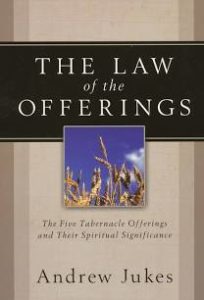
Andrew Jukes
Recommendation: 4/5
Description of author: Andrew Jukes (1815-1901) was an Anglican clergyman educated at Cambridge.
Comments: I suppose not too many current day American Christians would pick up a book on the sacrifices of Leviticus. It would seem that a study of the five tabernacle offerings would offer very little by way of practical Christian living. Yet the spiritual truths unearthed and explained by Jukes are not only beautiful, they are extremely important in the midst of a modern church that knows little of the meaning of the word sacrifice. Jukes has an opening chapter on types in general, a chapter on each type of Levitical offering (burnt offering, meat offering, peace offering, sin offering, and trespass offering), and a summary chapter on the offerings as a whole. He explains how each offering beautifully and intricately pictures a different aspect of Christ’s work. In some respects this book is difficult to read, simply from the perspective that most of us are not overly familiar with the different kinds of sacrifices and all the variations within the sacrifices. But the real richness of this book comes out as he (1) describes the life and work of Christ (e.g. p. 63-65, 81-83, 97) and (2) makes application to the Christian’s life (e.g. p. 175-176, 195-196). I close this review with one of the more relevant quotes in the book: And in these days when pious worldliness is so successfully misusing the truth of God; when in the light of the advanced wisdom of this our age, self-sacrifice is exploded folly; when the mere fact that a path involves loss in this world, is considered good reason for our at once avoiding it; when the doctrine of the cross, as it bears upon our walk, is not only omitted, but openly condemned; when to give up the world is injudiciousness, and to crucify the flesh a return to law; in such days we do well to look to the Burnt offering, as setting before us the example we are called to follow . . . A path has been found, a happy path some think it, wherein the highest profession of Christ costs nothing; nay, in which such a profession, so far from involving the loss of this world, is the surest way to gain its praise. According to this doctrine, Christ suffered for us; apostles, prophets, martyrs, all suffered. They, in their pilgrimage, lost this world for another; but we, in happier days, can possess both worlds. It cannot be. If God’s Word be true, our path after Christ must be still a sacrifice. We, as they of old, if followers of Christ, must with Him present our bodies a living sacrifice (p. 195-196).